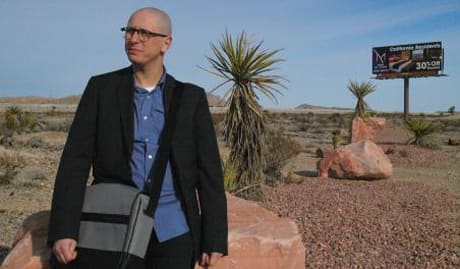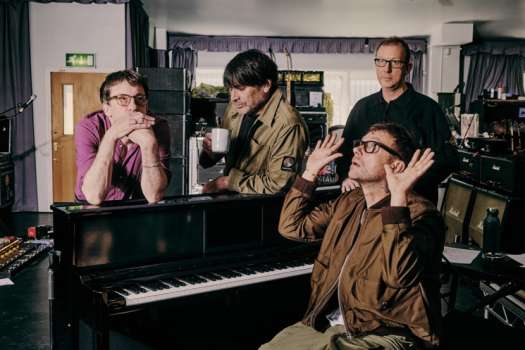A good rule of thumb for broadly opposing ideologies engaging in the crudity that is intellectual debate is that the idealist, or optimist, here represented by the Woman of Tomorrow (Liane Balaban), will spend most of their time trying to convert the realist, or cynic, here represented by the Man of Today (Paul Ahmarani), despite their indifference towards agreement. This notion of saving (or deluding) people is the impetus behind the deliberately contrived documentary, of sorts, The Future is Now, wherein an alacritous, sanctimonious reporter sends a man, who she constantly tries to label a "libertarian" or "conscientious defeatist," around the world to experience art, culture and science in an effort to make him a generic, middle-class, bourgeois, urban liberal. The documentary aspect comes into play via the many interviews and discussions he has with various real-life novelists, poets, artists, architects and philosophers. Amidst the discussions about glib topics like the rich getting richer and our individual responsibility to communicate the importance of helping future generations, some philosophies arise like Sartre's assertion that everyone believes everyone else is the problem, along with some discussion about how defining things by good and evil is sheer nonsense. There are occasional moments of intrigue, primarily the interview with philosopher Alain de Botton, about how to exist in modern society, but the chief contrivance of the film itself leaves everything feeling strained and desultory. This is particularly evident when a persistent voiceover from Ahmarani pops up to paraphrase interview subjects, guiding their tangents, which don't always pertain to the central plot device, back on track. Fortunately, Gary Burns and Jim Brown seem conscious of this, as well as the absurdity that Ahmarani's character would be so easily convinced to change his guiding ethos, inserting sassy comments like, "I don't think most people are quite as open to change as you are." And ostensibly, the film hoists its solipsistic agenda a little too high, championing individual responsibility to force fruitless idealism onto others while doling out the amusing assertion that empowering the youth of today will help the future – if only they'd thought to step back and analyze modern youth culture before going down that road. Of course, that would probably disprove their thesis. No supplements are included with the DVD, which makes sense, since it mostly speaks for itself.
(eOne)The Future is Now!
Gary Burns and Jim Brown

BY Robert BellPublished Feb 17, 2012



